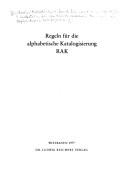| Listing 1 - 10 of 41 | << page >> |
Sort by
|
Book
ISBN: 897297109X Year: 1993 Publisher: 서울 동녘
Abstract | Keywords | Export | Availability | Bookmark
 Loading...
Loading...Choose an application
- Reference Manager
- EndNote
- RefWorks (Direct export to RefWorks)
Book
ISBN: 3794030362 Year: 1976 Publisher: Munchen VD
Abstract | Keywords | Export | Availability | Bookmark
 Loading...
Loading...Choose an application
- Reference Manager
- EndNote
- RefWorks (Direct export to RefWorks)

ISBN: 3920153987 3920153995 392015398X 9783920153995 Year: 1977 Publisher: Wiesbaden: Reichert,
Abstract | Keywords | Export | Availability | Bookmark
 Loading...
Loading...Choose an application
- Reference Manager
- EndNote
- RefWorks (Direct export to RefWorks)
Descriptive cataloging --- Catalogage --- Rules. --- Règles --- Règles --- Regeln für die alphabetische Katalogisierung, RAK. --- Alphabetical cataloguing --- Rules

ISBN: 0878670211 087867022X Year: 1972 Publisher: San Francisco : Ramparts Press,
Abstract | Keywords | Export | Availability | Bookmark
 Loading...
Loading...Choose an application
- Reference Manager
- EndNote
- RefWorks (Direct export to RefWorks)
Communism --- Korean resistance movements, 1905-1945. --- Communisme --- History. --- Histoire --- Chang, Chi-rak,
Book
ISBN: 9004314482 9004310290 Year: 2016 Publisher: Leiden ; Boston : Brill,
Abstract | Keywords | Export | Availability | Bookmark
 Loading...
Loading...Choose an application
- Reference Manager
- EndNote
- RefWorks (Direct export to RefWorks)
In the figure of ʿAbdallāh born al-Mubārak (118–181/736–797), we find a paragon of the fields of ḥadīth , zuhd , and jihād , as attested to by the large number of references to him in the classical Islamic texts. His superior rank as a ḥadīth transmitter earned him the title “commander of the faithful” in ḥadīth. He contributed to Islamic law at its early phases of development, practiced jihād, composed poetry, and participated in various theological discussions. In addition, Ibn al-Mubārak was a pioneer in writing on piety and was later regarded by many mystics as one of the earliest figures of Sufism. Ibn al-Mubārak’s position during the formative period of Islamic thought illustrates the unique evolution of zuhd, ḥadīth, and jihād; these form a junction in the biography of Ibn al-Mubārak in a way that distinctively illuminates the second/eighth-century dynamics of nascent Sunnī identity. Furthermore, Ibn al-Mubārak’s status as a fighter and pious figure of the Late Antique period reveals a great deal about the complex relationship between the early Muslim community and the religiously diverse setting which it inhabited. This critical and comprehensive monograph of ʿAbdallāh born al-Mubārak situates him within the larger context of the social and religious milieu of Late Antiquity. It explores the formation of Sunnī identity in the second Islamic century and demonstrates the way in which it manifested itself through networks of pious scholars who defined, preserved, and passed on what they understood to be normative Islamic practice and beliefs from one generation of Muslim intellectuals to another.
Hadith scholars --- Islam --- Islamic civilization. --- History. --- Ibn al-Mubārak, ʻAbd Allāh,
Book
Year: 2011 Publisher: [Washington, D.C.] : The Law Library of Congress, Global Legal Research Directorate,
Abstract | Keywords | Export | Availability | Bookmark
 Loading...
Loading...Choose an application
- Reference Manager
- EndNote
- RefWorks (Direct export to RefWorks)
Indictments --- Presidents --- Legal status, laws, etc. --- Mubārak, Muḥammad Ḥusnī, --- Egypt --- Politics and government.
Book
Year: 2014 Publisher: [Washington, D.C.] : The Law Library of Congress, Global Legal Research Directorate,
Abstract | Keywords | Export | Availability | Bookmark
 Loading...
Loading...Choose an application
- Reference Manager
- EndNote
- RefWorks (Direct export to RefWorks)
Indictments --- Presidents --- Legal status, laws, etc. --- Mubārak, Muḥammad Ḥusnī, --- Egypt --- Politics and government.
Book
ISBN: 9774165675 1306492750 9774164008 1617970549 1617974986 Year: 2012 Publisher: Cairo ; New York : The American University in Cairo Press,
Abstract | Keywords | Export | Availability | Bookmark
 Loading...
Loading...Choose an application
- Reference Manager
- EndNote
- RefWorks (Direct export to RefWorks)
Galal Amin once again turns his attention to the shaping of Egyptian society and the Egyptian state in the half-century and more that has elapsed since the Nasserite revolution, this time focusing on the era of President Mubarak.He looks at corruption, poverty, the plight of the middle class, and of course, the economy, and directs his penetrating gaze toward the Mubarak regime's uneasy relationship with the relatively free press it encouraged, the vexing issue of presidential succession, and Egypt's relations with the Arab world and the United States. Addressing such themes from the perspecti
Mubārak, Muḥammad Ḥusnī, --- Egypt --- Politics and government --- Social conditions --- Economic conditions --- Moubarak, Hosni, --- Mubarak, Hosni, --- Mubārak, Ḥusnī, --- Mubarak, Mohamed Hosni, --- مبارك، محمد حسني, --- محمد حسني مبارك, --- محمد حسنى مبارك،
Book
Year: 2011 Publisher: Washington : U.S. G.P.O.,
Abstract | Keywords | Export | Availability | Bookmark
 Loading...
Loading...Choose an application
- Reference Manager
- EndNote
- RefWorks (Direct export to RefWorks)
Democratization --- Mubārak, Muḥammad Ḥusnī, --- Egypt --- Middle East --- Lebanon --- United States --- History --- Politics and government --- Foreign relations

ISBN: 1282066048 0253108578 9780253108579 025334042X 9780253340429 0253215641 9780253215642 0253341817 9780253341815 Year: 2002 Publisher: Bloomington ; Indianapolis : Indiana University Press,
Abstract | Keywords | Export | Availability | Bookmark
 Loading...
Loading...Choose an application
- Reference Manager
- EndNote
- RefWorks (Direct export to RefWorks)
Zionists --- Jewish women --- Jews --- Hebrews --- Israelites --- Jewish people --- Jewry --- Judaic people --- Judaists --- Ethnology --- Religious adherents --- Semites --- Judaism --- Women, Jewish --- Women --- Persons --- Raḳoṿsḳa, Puʻah, --- Rakovsky, Pua, --- Rakowski, Puah, --- Raḳoṿsḳi, Puʻah, --- Raḳoṿsḳi, Pueh, --- Rakowski, Pua, --- Rakovsky, Puah, --- ראקאָווסקי, פועה, --- ראקאווסלי, פועה --- ראקאווסקא, פועה, --- Raḳoṿsḳa, Puʻah, --- Rakowska, Pua,
| Listing 1 - 10 of 41 | << page >> |
Sort by
|

 Search
Search Feedback
Feedback About UniCat
About UniCat  Help
Help News
News